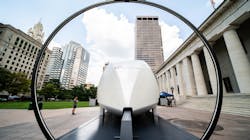Virgin Hyperloop One demonstrates hyperloop technology in Washington, D.C.
Virgin Hyperloop One (VHO) showcased its XP-1 test pod on Capitol Hill in Washington, D.C., as part of VHO’s national roadshow to introduce hyperloop technology.
As the company continues to work on broadening bipartisan support of its transportation technology, Representatives from the House Committee on Transportation and Infrastructure Troy Balderson (R-OH-12) and Bruce Westerman (R-AK-4), and Congressman Mike Turner (R-OH-10), Congressman Bob Gibbs (R-OH-7), and Congressman Billy Long (R-MO-7) today joined VHO Co-Founder and Chief Technology Officer Josh Giegel in calling for greater support of innovative mass transit technology across the United States, according to VHO.
“With hyperloop, we are launching the first new mode of mass transportation in over 100 years: one that is faster, cleaner and cheaper than ever before,” Giegel said. “When private innovators work hand in hand with lawmakers and policymakers at all levels of government, innovation thrives. We are proud to have support from these federal lawmakers on both sides of the aisle, all who recognize that the future of our national, regional and local economies hinges on advancing new, efficient forms of mass transit.”
“To go from Columbus to Chicago in 45 minutes is a big deal,” said Rep. Balderson. “I look forward to working with you and your team to get this done.”
Rep. Long added, “I’ve taken 60 of my constituents out to see this project. We’re really excited to be able to go from Kansas City to Columbia, Missouri – a little over 100 miles – in 15 minutes. Technology like this is right around the corner.”
Building off of the momentum of U.S. Secretary of Transportation Elaine Chao’s newly-formed Non-Traditional and Emerging Transportation Technology (NETT) Council to support new and innovative transportation projects like hyperloop and self-driving cars, VHO’s visit to Capitol Hill highlighted current U.S. hyperloop developments, including in Ohio, Missouri, Nevada, North Carolina and Texas, and provided updates on making these projects a reality.
VHO says the vision of the NETT Council is to develop and establish department-wide processes, solutions and best practices to identify and manage non-traditional and emerging transportation technologies; to help local and state governments; and to conduct research to better understand the safety and regulatory needs of these technologies. In May 2019, House Transportation and Infrastructure Chairman Peter DeFazio (D-OR-4) toured VHO’s full-scale test track outside of Las Vegas, Nev., adding him to the list of local and state officials who have shown interest in Virgin Hyperloop One’s technology.
U.S. Hyperloop Project Updates
North Carolina: The Regional Transportation Alliance (RTA) commenced an exploratory study to connect Raleigh, Durham, Chapel Hill and RDU International Airport near the Research Triangle Park to create a linchpin for a future hyperloop network across the southeastern U.S.
Texas: The Dallas-Fort Worth Regional Transportation Council has launched a hyperloop feasibility study of a Fort Worth to Laredo route and an environmental impact study along a Dallas to Fort Worth corridor.
Midwest: The Mid-Ohio Regional Planning Commission is conducting a feasibility study of hyperloop technology along a Chicago-Columbus-Pittsburgh corridor, followed by components of an environmental impact statement along the same route.
Missouri: The Missouri Hyperloop Coalition has released results from the first hyperloop feasibility study in the U.S. which confirmed the viability of a St. Louis to Kansas City route.
Nevada: DevLoop, Nevada’s hyperloop test site, continues as an active test site.
XP-1 Test Pod on the Road
VHO has traveled across the United States this year to showcase its XP-1 test vehicle. VHO staff connected with communities and educated local and state governments on the hyperloop technology. VHO’s technology would transport passengers and goods three times as fast as high-speed rail and enable regional cities to connect just as local city subways connect neighborhoods, according to the company.
To date, VHO has made stops in Missouri, Kansas, Texas, Ohio, North Carolina and New York to showcase its technology when it comes to advancing America’s transportation technology capabilities.
VHO’s technology features depressurized tubes that carry on-demand passenger or cargo pods at speeds of up to 670 miles per hour, powered by magnetic-levitation and electric propulsion. Its depressurized tube infrastructure eliminates the impacts of air-drag and friction, requiring less energy and cost to operate, and allows travel to occur at exceptionally high speeds, according to VHO.
